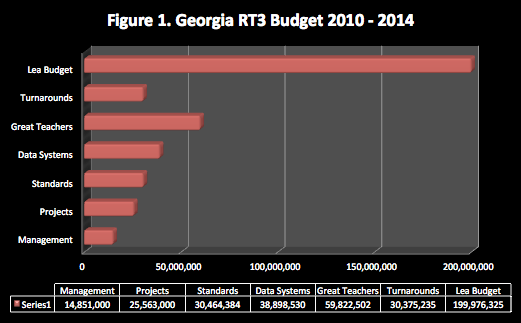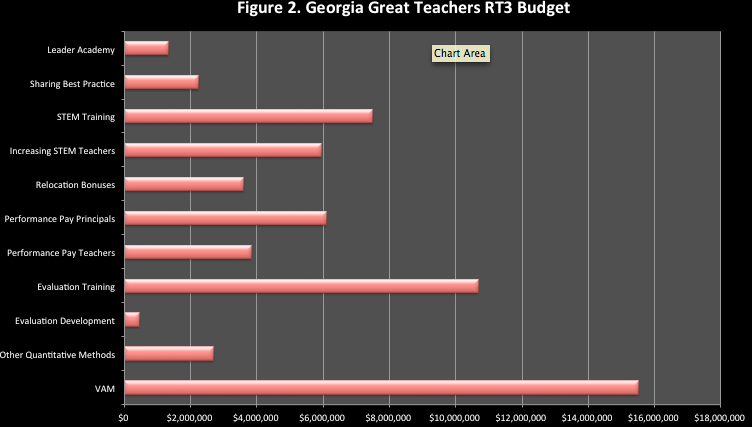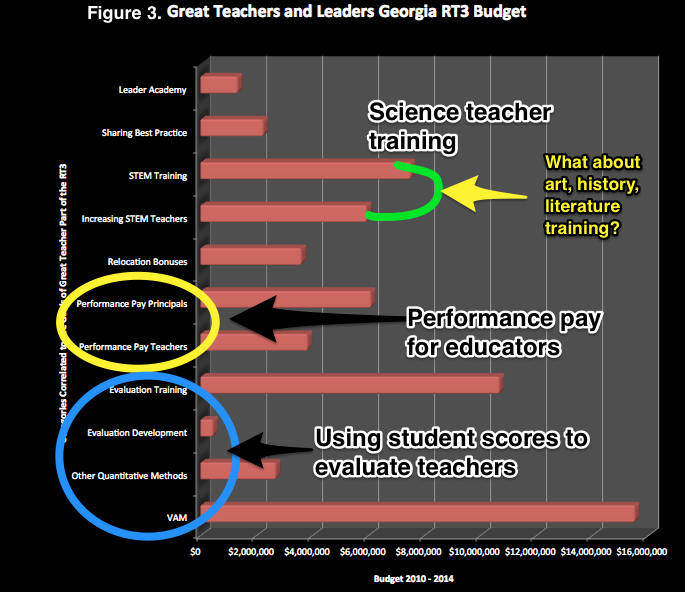We’re spending a lot of money to find great teachers in Georgia. Admittedly, Georgia isn’t the only state where this is happening. Thanks to the Race to the Top Fund, the race is on to implement a system to score teachers based on pre-post test scores.
The $4 billion Race the Top Fund, which was distributed among 11 states and the District of Columbia, specified the reform goals that applicants had to include in their proposals. The reform goals were grouped into six categories, plus a seventh category which called for making a priority of STEM (Science, Technology, Engineering and Math). The categories and the relative value (total of 500 points) placed on them by the reviewers were these:
- Great Teachers and Leaders (worth 138 points)
- State Success Factors (125)
- Standards and Assessment (70)
- General Selection Criteria for Charters (55)
- Turning Around Lowest-Achieving Schools (50)
- Data Systems to Support Instruction (47)
- STEM (15)
How to Spend $400 Million
The relative scoring that was used to rate RT3 proposals prioritized the goals for educational reform. Georgia received nearly $400 million as shown in Figure 1. The most funding was allocated to the category of Great Teachers and Leaders (other than the amount allocated to the 26 LEA’s that are participating in the grant).
As shown in Figure 1, $59.8 million was allocated to various projects with in the Great Teachers and Leaders work plan.
Nearly 30% of the RT3 budget has been allocated to the development of Great Teachers and Leaders. What is a great teacher? What is a great leader? Does the Georgia Department of Education (GDOE) have a plan that will encourage teachers to be creative and innovative, two of the qualities that many would claim are indicators of a great teacher.
Later in the post, we’ll find out that the Race to the Top administrators have something else in mind.
But, in the meantime, what is a great teacher?
Great Teachers
In order to answer this question, I am going to write about the work that Dr. Peter Smagorinksy, Distinguished Research Professor of English at the University of Georgia (UGA) has done to highlight examples of Georgia teachers who understand what it takes to work with youth in our public schools. Dr. Smagorinksy has written several essays that are part of the Georgia Great Teacher Series. His essays engage us in the lives and professional work of a number of Georgia teachers that will help us understand what great teaching is, and who he considers to be a great teacher.
His essays are important in light of the present drive in Georgia to test teachers using simple metrics such as student test scores. In fact, in a recent report published by the inept organization, the National Council of Teacher Quality (NCTQ), it says that student test scores should be used in all matters of education including teacher salaries, tenure, and teaching licenses. It’s an organization that believes that the only aspect of schooling that has worth is academic achievement as measured on bubble tests.
Unfortunately, this belief is held by the U.S. Department of Education, and is articulated through the $4 billion Race to the Top Program. There is more to learning than how well our kids do on achievement tests.
Dr. Smagorinksy opens the dialog to show us that teaching is much more than holding teachers hostage to student test scores. He writes:
Teachers sure are taking a beating these days. Not all teachers, however. If you’re in a private school or charter school, you must be pretty danged good. No, it’s just the teachers with the hardest jobs who get the abuse heaped on them, day after day, by the great and small, named and anonymous: those in regular old public schools.
Teachers are subjected to increasingly urgent calls for accountability, no doubt because those high salaries and other cushy benefits need to be justified in the most rigorous, reliable, and valid of ways. No, make that way, not ways: The only measure of successful teaching these days is their students’ test scores. Everything that teachers do for kids can easily be boiled down to those scores, regardless of whether those kids have fridge full of healthy food or a clean change of clothes at home; or for that matter, a home at all.
Or, maybe teachers can be appreciated for other things that they do. In this series of columns, I’d like to feature teachers I know of who do extraordinary work, often with kids whose life circumstances do not predict college attendance or other arenas where test scores matter to them enough to do their best. What I hope to accomplish is to provide profiles of outstanding teachers without referring to their ability to train students to fill in bubbles on machine-scored answer sheets.
One of the teachers that Dr. Smagorinksy know and admires, is David Ragsdale of the Clark Central High School in Athens, GA. He knew David as a student at UGA when he was taking graduate courses with him. He says of David:
I was always pleased to find him in my classes because of the ripple effect he had on other students. It’s pretty hard to be in a class with someone of boundless inquisitiveness and vigor, and not get caught up in the momentum yourself. He set a high standard for engagement and participation that inevitably gave the classes vitality and purpose—certainly for me as a teacher, and I believe also for the other students in the class, many of whom, like David, were coming to campus after a demanding and often exhausting day of teaching their own classes in Georgia schools.
As a teacher, David has “taken a special interest throughout his teaching and education in the quality of learning experienced by students from low socioeconomic status groups. In Athens, which is one of the poorest counties in the country, he was a leader in his passion for social-justice, and lead the way in founding the Red Clay Writing Project, which brought together teachers from North Georgia who became leaders in their respective schools, especially as it connected to the National Writing Project.
But, as Dr. Smargorinsky points out, David Ragsdale most remarkable achievement was his founding of two magazines at Clark Central High School, the Odyssey (news) and the Iliad (literary). Dr. Smargorinsky says:
David saw the need for students to take pride in and have outlets for their writing, and so revived the Iliad and launched the Odyssey. Taking this initiative in a school in which student writing was so little appreciated reveals much about David’s spirited optimism and faith in his students in a setting in which many have simply given up on students’ prospects for achievement. Serving as advisor to one or the other of these publications would be an onerous amount of work; founding and advising both while pursuing graduate studies and being a key player in the RCWP is simply remarkable.
Each of these magazines has, under David’s dynamic leadership, risen to national prominence in very short order.
There are hundreds of teachers who have the same kind of enthusiasm for their students, and for the work they do in their respective schools. When we look deeply into the professional work of teachers, it’s a disservice not only to our teachers, but more definitely to our student if we believe that achievement tests scores are what education is about.
Here are some additional biographies of Great Teachers by Dr. Smagorinsky.
- Lisa Miller, Moreland Road Elementary School, Griffin-Spalding County, GA
- Mark Weese, Science teacher, Rincon, Effington County, GA
- Bettina Polite Tate, Johnson High School, Savannah, GA
- Justin Sealy, Pelham City Middle School, Pelham City Schools, GA
- Travis Ellington, Toombs County High School, Toombs County, GA
- Angela Dean, Mountain View High School, Gwinnett County, GA
In Georgia’s Race to the Top program, these teachers could teach the administrators of the RT3 a lot about Great Teachers and Leaders. But would they really listen.
I don’t think they would.
$60 Million on Great Teachers?
If you take a look at how the RT3 is spending nearly $60 million on Great Teachers, you might scratch your head, and wonder, what are they thinking? Figure 2 shows how the funds are used in the Great Teachers and Leaders work plan.
Notice that nearly $16 million will be spent developing a system to evaluate teachers using student achievement test scores. The state has begun the development of a Value Added Measure (VAM) that will be used to evaluate and rate teachers. In fact, our esteemed Georgia Legislature has passed a law requiring that at least half of a teachers evaluation must be based on student test scores.
What about Art Teachers?
But don’t stop with VAM. Look more closely at the budget. I’ve marked up the Great Teachers RT3 budget (Figure 3). I’ve highlighted three aspects of the budget. At the top, note that there is funding for STEM training and for increasing the “pipeline” of science and math teachers. This is one of the cornerstones of the Federal RT3, and Georgia has included it in their work plan. Now keep in mind that I am a science educator, and have been for a very long time. But I must ask, why are there no funds for art, or history, or music, or literature?
Focusing attention only on math, science and English/language arts is a mistake. There are many questions that need to asked about our increasing emphasis on these subjects, and at the peril of the arts, health, history, music and physical education.
Performance Pay
A second part that I’ve highlighted is the categories listed for performance pay for principals and teachers. There is nearly $10 million for performance pay. Performance pay is a bonus that will be determined by how well students perform on achievement tests. Yet in studies done on the effect of performance pay schemes on student achievement, the results do not favor bonuses. In fact, we can ask serious questions about the cheating scandals that have cropped out in many school districts around the country, all of which put a premium on administrators getting the most out of its students—that is, their score on achievement tests. Check out this report from Vanderbilt University.
VAM
And then, take a look at the bottom of the graph, and note that nearly half of the Great Teacher budget is connected to using VAM as the measure of teacher effectiveness.
A large group of Georgia professors prepared a letter which was sent to key politicians including the governor, the GA state school superintendent, and the superintendents of 29 school systems. The letter challenges the teacher and leader evaluation system, identifies the unintended negative consequences, and recommends the state opt out of this invalidated and unreliable system. These research professors provided data to support the following conclusion/recommendations for using VAM scores.
- Value Added Models are not proven;
- GA is not prepared to implement this evaluation model;
- This model is not the most useful way to spend education funds;
- Students will be adversely affected by this Value Added Model.
Student achievement tests were not designed to measure teacher or administrator performance. They were designed to measure student learning, but for years researchers have warned not to try and make connections between student test scores and teacher performance. The Value Added Measure (VAM) is just as unreliable as the student test scores used to generate a VAM number. According to the Georgia Professors’ Letter, No evidence exists that evaluation systems that incorporate student test scores produce gains in student achievement. In order to determine if there is such a relationship, researchers recommend long-term, small-scale pilot testing of such systems. Furthermore, student test scores have not been found to be a strong predictor of the quality of teaching as measured by other instruments or approaches.
Georgia is headed down a path that will end up creating more problems that it solves. This plan will not improve student achievement, nor will it lead to the improvement of the quality of teaching. What it will do is demoralize teachers who have worked for years to improve what happens in the classroom.
And finally I would add this quote from Diane Ravitch’s new book, Reign of Error: The Hoax of the Privatization and the Danger to America’s Public Schools.
Yet the myth persists that the teacher is primarily responsible for student scores and that great teachers can overcome the influence of family, poverty, disability status, language proficiency, and students’ own levels of interest and ability. Certainly, there are many people whose lives were changed by one teacher, but their stories typically describe teachers who were unusually inspiring, not “the teacher who raised my test scores to the top.” Teachers do have the power to change lives. But after more than a decade of No Child Left Behind, researchers are still searching for a nonselective school or a district where every student, regardless of his or her starting point, has achieved proficiency on state tests because that school or that district has only effective teachers. (Ravitch, Diane (2013-09-17). Reign of Error: The Hoax of the Privatization Movement and the Danger to America’s Public Schools (Kindle Locations 2144-2145). Knopf Doubleday Publishing Group. Kindle Edition).
What do you think? Are we heading down the wrong path by spending nearly $60 million on Great Teachers as described in Georgia’s Race to the Top?







0 Comments